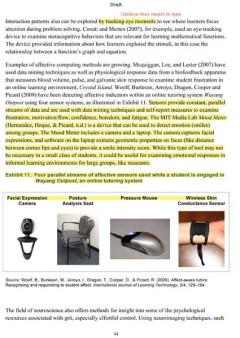Data Mining Our Children
What if your math syllabus could tell you what to eat for breakfast to score higher on your quiz tomorrow? Jose Ferreira, CEO of Knewton, shares his vision for a future where every student receives a truly personalized curriculum best suited to his or her needs. Knewton collects millions of data points about student users in order to provide them with more effective timing and content to enhance learning. Is data mining a solution to our problems, or is it contributing to our downfall?
A massive spy ring is feeding information about hundreds of millions of children, teachers, parents, and any “dissidents” into a supercomputer in Washington, making the surveillance state under Hitler look like child’s play.
Children as young as five will be “evaluating” other students and teachers, and “monitoring” political thought at home—this pushed by none other than Michelle Obama—all in the name of “education.”
Under the guise of “academic standards,” Obama’s Common Core standards program is a wholesale federal takeover of the education system. But education has nothing to do with it, as is apparent with the use of ludicrous methods being used to teach basic math, dumbed downed workbooks to teach reading, and having children read openly pornographic short stories and novels in the name of “inclusiveness.” Read more….
“Gunshot detectors” in classrooms surpass Big Brother in 1984 and the real East German Stasi
In a stinging similarity to the telescreens of 1984, schoolchildren will soon be monitored in real-time through surveillance sensors mounted inside the classrooms of a charter school in Oakland, California.
…..these “gunshot detectors” are fully capable of recording conversations and are reportedly better at doing so than actually detecting gunshots.
 Department of Education Report titled “Promoting Grit, Tenacity, and Perseverance” shows some of the devices they plan to use to collect information.
Department of Education Report titled “Promoting Grit, Tenacity, and Perseverance” shows some of the devices they plan to use to collect information.A February Department of Education report titled “Promoting Grit, Tenacity, and Perseverance”https://www.fpeusa.org/index.php/about/defeating-common-core reveals the federal government’s plans for data-mining which includes the use of very disturbing monitoring techniques such as “functional magnetic resonance imaging” and “using cameras to judge facial expressions, an electronic seat that judges posture, a pressure-sensitive computer mouse and a biometric wrap on kids’ wrists.” See page 44 of this report for images of this specialized equipment they would like to use on our children.
The DOE report exposes the big lie that Common Core is about raising academic standards by revealing its progressive designs to measure and track children’s “competencies” in “recognizing bias in sources,” “flexibility,” “cultural awareness and competence,” “appreciation for diversity,” “empathy,” “perspective taking, trust (and) service orientation.”
THE DANG’AN
The Western-inspired and Western-financed Chinese revolution, following hard on the heels of the last desperate attempt by China to prevent the British government traffic in narcotic drugs there, placed that ancient province in a favorable state of anarchy for laboratory tests of mind-alteration technology. Out of this period rose a Chinese universal tracking procedure called “The Dang’an,“ a continuous lifelong personnel file exposing every student’s intimate life history from birth through school and onwards. The Dang’an constituted the ultimate overthrow of privacy. Today, nobody works in China without a Dang’an. What would this mean for America? Let’s see what it means for life in China.
During this Jul 28, 2009 speech, (video) Bill Gates speaks about the Common Core State Standards Initiative and the potential benefits (to Microsoft and other education suppliers) from states adopting this initiative. “The common core state standards demand a new education marketplace. Privatized centralization of testers, data reporters and analytics to “integrate” and “personalize” education–all in the name of “accountability.” Bill Gates is one of the major funders of the development and promotion of Common Core standards. His companies, Microsoft, inBloom, and others he has acquired, stand to make a fortune off the taxpayer funded education system.
Parents can learn how much data is being collected and shared in their state at the website, DataQualityCampaign.org.
From the National Center for Education Statistics: The Common Education Data Standards (CEDS) project is a national collaborative effort to develop voluntary, common data standards for a key set of education data elements to streamline the exchange, comparison, and understanding of data within and across P-20W institutions and sectors.
Parents, Don’t Be Deceived by the Proponents of Common Core
By Angela Bean, Georgia
This is in response to the article by Bill Maddox with Georgia Partnership for Excellence in Education in the Fayette Citizen newspaper, where he claims Common Core does not require the collection of any data about students. I always find it interesting that the proponents of Common Core nationalized standards never provide proof of what they claim. So, in my response I will supply the documentation so parents can do their own research to know the truth about the privacy issues surrounding the collecting of data on their children.
Parents need to know that data collecting on our nation’s government school children has been ongoing for decades. The U.S. Department of Education’s own handbooks on data-gathering on students and faculty should be enough to satisfy any freedom-loving citizen. The two publications are the Student Data Handbook for Early Childhood, Elementary, and Secondary Education (NCES 94–303) released in June 1994, and the Staff Data Handbook: Elementary, Secondary and Early Childhood Education (NCES 95–327) released in January 1995. Both Handbooks were produced under the auspices of the U.S. Department of Education, the Office of Educational Research and Improvement (OERI), and the National Center for Education Statistics (NCES). (From “The Deliberate Dumbing Down of America” by Charlotte Iserbyt)
The Foreword for the Student Data Handbook states: “NCES is pleased to release the 1994 Student Data Handbook: Elementary, Secondary and Early Childhood Education. It is a major effort to establish current and consistent terms, definitions and classification codes to maintain, correct, report and exchange information about students. When this effort began, the only existing national standards for student data had been published by NCES in 1974. Because student data have evolved greatly over time both in the type and format of data maintained, it was essential that new standards be developed that would reflect current practices. NCES has a strong commitment to provide technical assistance and support to the education community to facilitate the collection, reporting, and use of high quality education information. This handbook is one outcome of that commitment. It is but one in a series of related handbooks and manuals that NCES has published in the past and plans to continue to develop in the future.” (From “The Deliberate Dumbing Down of America” by Charlotte Iserbyt)
So, what is the relationship between Common Core and data-collection? As part of Race to the Top, and elsewhere in the 2009 Stimulus bill, along with agreeing to adopt the Common Core standards, the states that wanted federal money had to commit to build massive student databases. These databases are designed to track children from preschool (or earlier), through college, and into the workforce. At this time, Georgia, along with the other states who made this agreement, also agreed to move all the student (and teacher) data to Google servers for storage. If you are following the stories on the national data collecting by the NSA, you know that our federal government has access to all data stored on these servers, including our student’s information.
According to Forbes: Emails between National Security Agency (NSA) director General Keith Alexander and Google’sGOOGL -1.37%Sergey Brin and Eric Schmidt have been published by Al Jazeera, showing that the agency was working with the company two years ago.
The emails, says Al Jazeera, “suggest a far cozier working relationship between some tech firms and the US government than was implied by Silicon Valley brass after last year’s revelations about NSA spying.”
According to this article:
Google Is Making it Harder for the NSA to Grab Its Data
Google and other technology companies are strengthening their defenses against NSA intelligence gathering While this MIGHT be true…. the bottom line is this: Americans have come to realize that our government is partnering with private businesses to data mine our private and confidential information. We cannot ever be assured that the private and confidential data collected on our children every day in the government run k-12 system is secure from the NSA regardless of what Google claims.
I believe it is time for our state legislators to take action to stop ALL collection of data on our children other than test scores and homework grades. And, this data should be stored locally NOT on national servers. There is no constitutional authority for the federal government to have any information on our children and families.
As you may know by now, the National Governors Association (NGA) and the Council of Chief State School Officers (CCSSO) are the organizations that the proponents of Common Core standards point to as the “state led” component of development. Citizens should know that these are private trade organizations with no legislative authority to change education standards. Learn more about the NGA and their connection to the standards here…
A 2008 report by the NGA, the CCSSO, and Achieve, Inc. (another private trade organization contracted by the NGA and the CCSSO to develop the Common Core standards) titled Benchmarking for Success: Ensuring U.S. Students Receive a World-Class Education laid out the framework for the Common Core national standards. In this document is a list of actions including data collecting. (NOTE: accountability and measuring performance means collecting data) The actions related to data collection:
Action 4: Hold schools and systems accountable through monitoring, interventions, and support to ensure consistently high performance, drawing upon international best practices.
Action 5: Measure state-level education performance globally by examining student achievement and attainment in an international context to ensure that, over time, students are receiving the education they need to compete in the 21st century economy.
Web link to this report.
According to the website of Achieve, Inc, “States must collect, coordinate, and use K-12 and postsecondary data to track and improve the readiness of graduates to succeed in college and the workplace.” Remember, Achieve, Inc. helped develop the Common Core national standards.
According to the website of the Council of Chief State School Officers, Several states became partners in data collecting with this Bill Gates company. Georgia became a Tier II participant in the collection of data through a Bill Gates company called the Shared Learning Collaborative. The website states “Although the SLC technology delivers the advantage of a common infrastructure for data integration and application interoperability, the end-user experience will be customized by participating states and districts.
According to a fact sheet produced by the CCSSO “The collaborative is designing a shared technology infrastructure that will support the implementation of the Common Core State Standards and help states and districts provide teachers with the instructional data and tools they need.”
Along with a few other states Georgia is a participant in the Shared Learning Collaborative (SLC) The Shared Learning Collaborative has morphed into “inBloom, Inc.” (Bill Gates company setting up it’s headquarters in Atlanta and will provide hundreds of jobs) to collect data to sell to education development vendors in order to create a “personalized curriculum” (online and other), based on the individual profile of our students, that will all be aligned to Common Core.
NOTE: Personalized curriculum is the goal of the 1992 legislation passed under the Clinton administration for “School-to-Work” or workforce training rather than a well rounded classical education where our children determine their own career paths. Learn More….
inBloom
The stated vision of inBloom from their website: “inBloom is dedicated to bringing together the data, content and tools educators need to make personalized learning a reality for every student.” inBloom has a list of over 400 data points that it would like to collect on our students. The National Education Data Model recommends collecting over 400 data points – academic performance, disciplinary history, family income range, religious affiliation, health history, etc.
Bill Gates has agreed to move the inBloom company headquarters to Atlanta. This is a “feather in the cap” for Georgia’s Governor Deal and his economic development goals bringing 650-700 jobs to Atlanta. At one time Georgia was listed as a partner with this company on the inBloom website. Is this possibly why Governor Deal is so committed to keeping Georgia’s schools tied to this national standard rather than allowing us to maintain local control as the U.S. Constitution allows?
This listing of Georgia as a partner with inBloom has now been removed, probably due to the many phone calls to Governor Deal’s office from parents, teachers, and citizens across Georgia with concerns over this data collecting. However, do not think that this means that your child’s school is no longer collecting data, we are. In Fayette County, GA the data collected is known as “Infinite Campus.” The national assessments are intended to create even more data. While Georgia has announced the pull out of our contract with the assessment consortia known as PARCC, State School Superintendent John Barge stated that Georgia will develop our own assessments aligned with Common Core. Notice that we are now assessing our children rather than having objective testing of knowledge.
Privacy Fears Over Student Data Tracking Lead to InBloom’s Shutdown
PARENTS: Ending this data collecting can’t be accomplished quickly, if at all, due to the massive commitments our states have made to the federal government. When your child participates in federally funded programs such as reduced/free lunch, sex ed, health ed, high school drop out prevention programs, and programs such as the “Positive Behavior Intervention and Support” (explained here)
GENERALLY PARENTAL CONSENT IS NOT GIVEN FOR THESE “NOSEY SURVEYS” WHICH ARE MOST OFTEN ADMINISTERED ONLINE. SO, TEACHERS DON’T EVEN KNOW WHAT IS BEING ASKED.
In Georgia, SB 167, the Common Core “withdrawal” bill clearly indicated that Georgia would comply with any and everything in the The Elementary and Secondary Education act regarding data collecting. The reauthroization of the ESEA is moving through congress and the Senate Version, S 1094, mandates the states collect up to 500 data points and share that info with the feds.
Legislative Update: November 18, 2015:
http://abcsofdumbdown.blogspot.com/2015/11/eseaanother-dangerous-giant-step-closer_72.html
inBloom to Shut Down Amid Growing Data-Privacy Concerns
After months caught in the crosshairs of parents, advocates, and educators concerned about student-data privacy, controversial nonprofit inBloom announced Monday that it will close its doors.
“I have made the decision to wind down the organization over the coming months,” inBloom CEO Iwan Streichenberger wrote in an email to the organization’s supporters. “The unavailability of this technology is a real missed opportunity for teachers and school districts seeking to improve student learning.”
The announcement comes on the heels of the New York state legislature’s recent enactment of legislation that effectively pulled the plug on inBloom’s last remaining large partner.
Founded in 2011, inBloom aimed to store, clean, and aggregate a wide range of student information for states and districts, then make the data available to district-approved third parties to develop tools and dashboards so the data could more easily be used by classroom educators.
Over the past year, however, the organization became a lightning rod for those concerned about the increased collection, use, and sharing of sensitive student information. The backlash prompted a string of withdrawals by planned partners in Colorado, Louisiana, and elsewhere.



